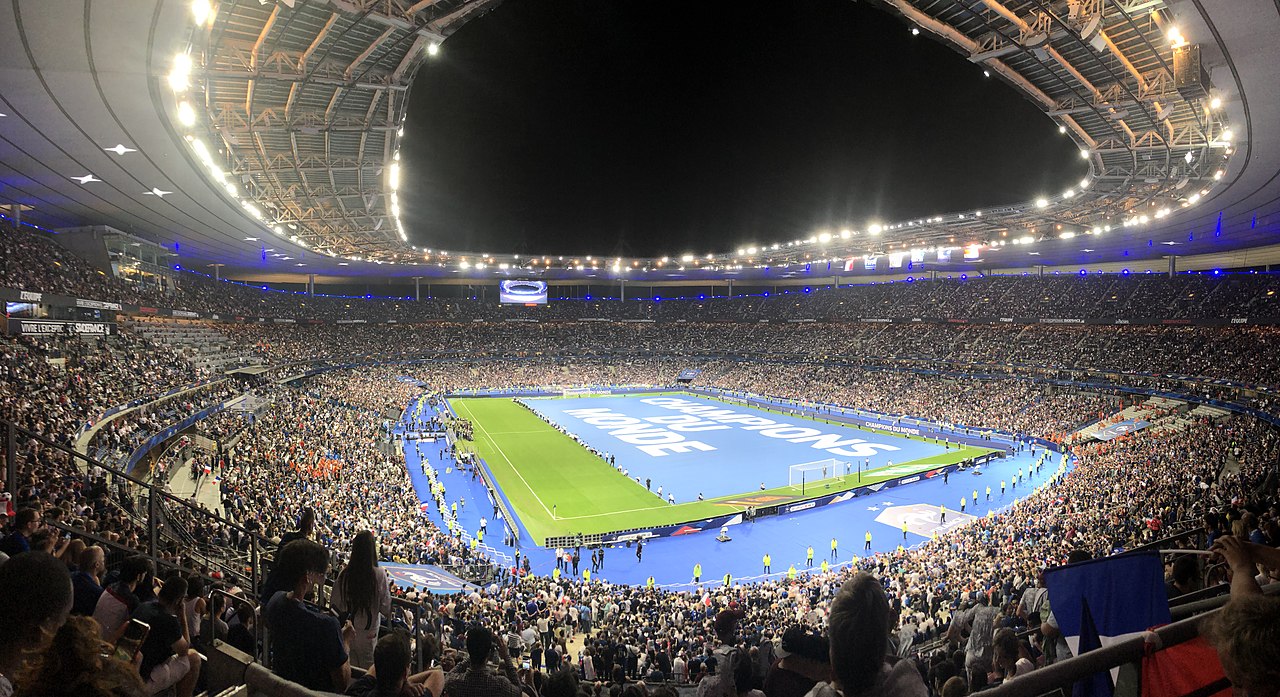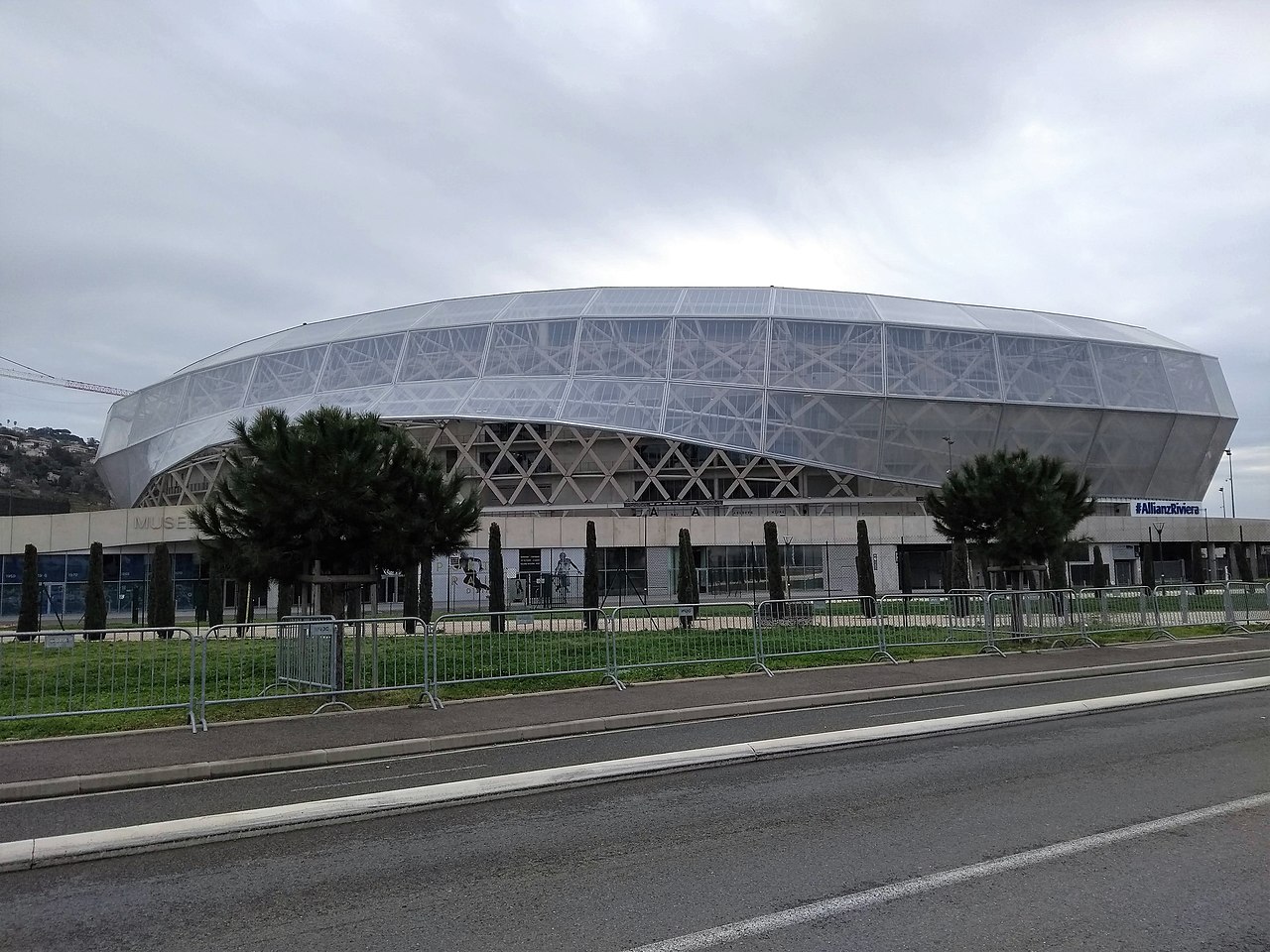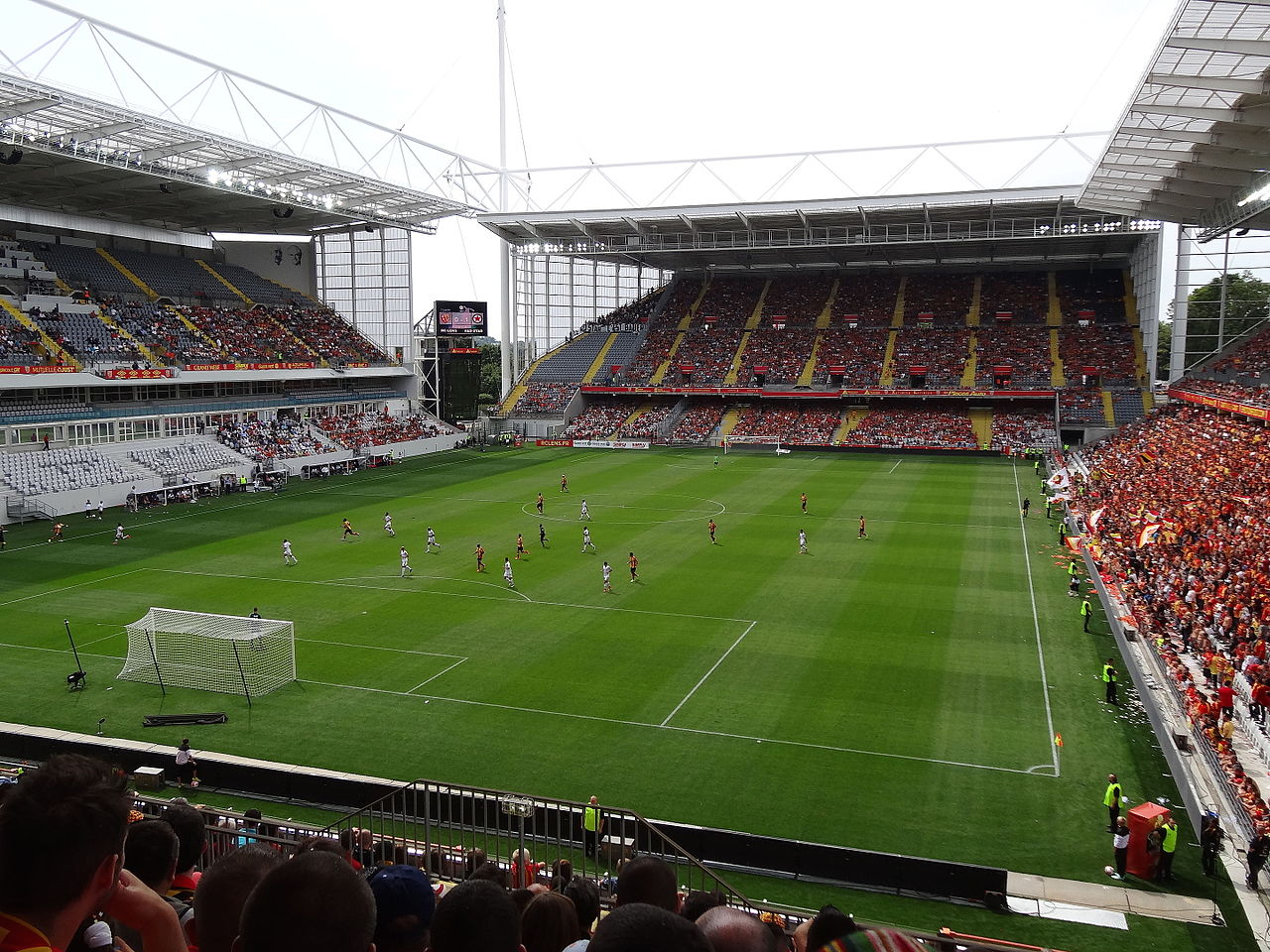Immerse yourself in the vibrant world of French sports and discover the allure of some of the country’s most iconic stadiums. From the grandeur of the Stade de France to the electric atmosphere of the Parc des Princes, these venues are more than just architectural marvels – they are the beating heart of France’s sporting heritage. Experience the adrenaline-fueled fervor at the Orange Velodrome and Groupama Stadium, where passionate fans come together to create an unrivaled sense of camaraderie. Feel the buzz at the Decathlon Arena-Stade Pierre-Mauroy and Stade Geoffroy-Guichard, where history and passion collide. And don’t miss the Stade Bollaert-Delelis and Allianz Riviera, iconic arenas that embody the innovation and vision of modern stadium design. Join us as we uncover the captivating stories and indelible experiences that make these French stadiums true gems in the world of sports.
1. Stade de France

Located just north of Paris in the commune of Saint-Denis, the Stade de France stands as a symbol of sports excellence. This magnificent football stadium, with a seating capacity of 80,698, is the sixth-largest in Europe, captivating the minds and hearts of passionate fans. Originally built for the 1998 FIFA World Cup, the stadium has witnessed epic battles and historic moments that have shaped the world of sports. Its grandeur extends beyond football, as it proudly hosts track and field events, boasting an impressive seating capacity of 78,338. The Stade de France holds a special place in the local community, serving as the battleground for the French national football and rugby union teams during international competitions. This remarkable venue will also welcome the 2024 Summer Olympics, further showcasing its significance as a global sporting hub. The Stade de France, a testament to architectural brilliance and sporting triumphs, stands tall as a beacon of passion, unity, and athletic prowess.
2. Orange Velodrome
The Orange Velodrome, also known as the Stade Vélodrome, is a magnificent multi-purpose stadium located in Marseille, France, Europe. This iconic venue has been the proud home of the Olympique de Marseille football club since 1937, solidifying its status as a historic landmark in the city. With its seating capacity of 67,000, the Orange Velodrome stands as the largest club football ground in all of France, making it a truly awe-inspiring sight for sports enthusiasts and spectators alike.
Not only is the Orange Velodrome a cornerstone of football in Marseille, but it has also had the honor of being a prestigious host for numerous international tournaments. It has graced the stages of the FIFA World Cup in 1938 and 1998, the UEFA European Championship in 1960, 1984, and 2016, as well as the Rugby World Cup in 2007. Additionally, it has been adored by the France national rugby union team and has occasionally welcomed the RC Toulon rugby club of the Top 14 into its embrace.
The significance of the Orange Velodrome stretches far beyond its sporting events. This illustrious venue holds a special place in the hearts of the local community, serving as a symbol of unity and pride. It has witnessed countless breathtaking moments and historical victories, fostering a sense of passion and devotion among its loyal fans. From memorable football matches to exhilarating rugby showdowns, the Orange Velodrome has truly become a sacred ground where dreams are nurtured and glory is achieved.
Nestled within the captivating city of Marseille, the Orange Velodrome stands as a testament to the rich sporting heritage of France and the enduring legacy of Olympique de Marseille. Its grandeur and majesty captivate all who have the privilege of stepping foot within its hallowed grounds, leaving an indelible mark on the hearts of sports lovers worldwide.
3. Groupama Stadium

Situated in the vibrant city of Lyon, France, the Groupama Stadium stands tall as a testament to sporting excellence and architectural brilliance. Serving as the home ground for the prestigious French football club Olympique Lyonnais, this majestic arena replaced its predecessor, the Stade de Gerland, in January 2016. With sponsorship proudly donning its name, the Parc Olympique Lyonnais, with a seating capacity of 59,186, offers an unrivaled experience for both players and fans alike.
The Groupama Stadium’s significance extends far beyond the world of football. A host of UEFA Euro 2016, this iconic venue has witnessed historic moments on the pitch. Moreover, it has been chosen as the stage for high-profile events such as the 2017 Coupe de la Ligue Final and the 2018 UEFA Europa League Final. Not only that, but it will also play a vital role in the 2024 Summer Olympics in Paris, hosting football matches.
Located in the enchanting suburb of Décines-Charpieu, within the Lyon Metropolis, the Groupama Stadium sits at the heart of a passionate and devoted community. The stadium’s presence has brought a sense of pride and unity among locals, as it represents not only a hub for thrilling sporting encounters but also a symbol of Lyon’s rich cultural heritage.
In addition to its affinity for football, the Groupama Stadium has also played host to exhilarating rugby union and ice hockey matches, captivating audiences with the sheer intensity and skill displayed on the hallowed grounds. Furthermore, the stadium transforms into a mesmerizing concert venue, attracting music aficionados from near and far.
With its grandeur and electrifying atmosphere, the Groupama Stadium is an awe-inspiring marvel that has etched itself into the annals of sporting greatness. Whether it be the thunderous roar of the crowd or the sight of footballing mastery on display, this iconic fortress leaves an indelible mark on all who have the privilege of gracing its vibrant atmosphere.
4. Decathlon Arena-Stade Pierre-Mauroy
The Decathlon Arena-Stade Pierre-Mauroy in Villeneuve-d’Ascq, France is an awe-inspiring football stadium that captivates both sports enthusiasts and casual fans alike. As its name suggests, this magnificent arena is home to the thrilling sport of football, where the roaring cheers of up to 50,000 spectators reverberate throughout its walls.
Nestled in the picturesque region of Villeneuve-d’Ascq, this stadium holds a significant place in the hearts of locals. Its immaculate grounds and state-of-the-art facilities have witnessed countless heart-stopping moments, contributing to the rich tapestry of football history. From the thunderous cheers of passionate fans to the skillful and captivating plays on the field, the Decathlon Arena-Stade Pierre-Mauroy epitomizes the true essence of the beautiful game.
The Decathlon Arena-Stade Pierre-Mauroy is more than just a football venue; it is a symbol of pride for the local community. The stadium’s stunning architecture and grandeur are testaments to the passion and dedication of the city’s residents. It has become a focal point, bringing people together to celebrate the sport they love and creating an everlasting sense of camaraderie.
No visit to Villeneuve-d’Ascq is complete without experiencing the electrifying atmosphere within the Decathlon Arena-Stade Pierre-Mauroy. Whether you are a die-hard football fan or simply intrigued by the magic of the game, this stadium promises an unforgettable experience that will leave you in awe of its splendor.
5. Parc des Princes
Parc des Princes, located in the enchanting city of Paris, France, is a captivating football stadium that truly embodies the spirit of the beautiful game. Nestled in the picturesque surroundings of the 16th arrondissement, this magnificent arena stands as a symbol of passion and excellence. With a seating capacity of 47,000, this all-seater stadium sets the stage for unforgettable football matches and unforgettable moments.
Steeped in history, Parc des Princes has been the beloved home of Paris Saint-Germain since 1974. Before the advent of the renowned Stade de France, it proudly served as the hallowed ground for both the French national football team and the national rugby union team. The stadium pays homage to its illustrious past with its four covered all-seater stands: the prestigious Tribune Borelli, the spirited Tribune Auteuil, the captivating Tribune Paris, and the dynamic Tribune Boulogne.
Designed by the visionary architect Roger Taillibert, along with the talented Siavash Teimouri, the Parc des Princes unveiled its current form on 25 May 1972. Its construction, a labor of love, came to fruition at a cost of 80–150 million francs, a testament to the commitment and dedication to creating a temple for football enthusiasts. This incarnation of the stadium represents the third iteration on this remarkable site, the first having emerged in 1897 and the second in 1932.
Beyond its rich history and exquisite design, Parc des Princes carries immense significance within the local community. It has witnessed countless memorable moments that have left an indelible mark on the hearts of football lovers. The stadium vibrates with energy, where dreams are made and heroes are born. The electric atmosphere generated by roaring crowds ignites the passion and fervor that football embodies, truly solidifying Parc des Princes as the beating heart of Parisian football.
With captivating architecture, storied traditions, and a thriving football culture, Parc des Princes stands as a testament to the unbreakable bond between sport and community. It encapsulates the essence of Paris and its deep-rooted love for football, making it a must-visit destination for fans and tourists alike. Step into this mesmerizing arena, where the grandeur of football comes to life, and allow yourself to be swept away by the magic that only Parc des Princes can provide.
6. Matmut ATLANTIQUE
Situated in the vibrant city of Bordeaux, France, Europe, Matmut ATLANTIQUE stands tall as a testament to the passion and love for football in the region. This state-of-the-art stadium, with its sleek and modern design, beckons sports enthusiasts from all corners of the globe. As you step into the stadium, you are immediately captivated by its majestic aura and the electrifying atmosphere it exudes.
With a seating capacity of 42,000, Matmut ATLANTIQUE provides the perfect setting for witnessing thrilling football matches. Every seat in the stadium offers a breathtaking view of the action, ensuring that fans never miss a moment of the excitement on the field. The roar of the crowd reverberates through the stadium, creating an unmatched sense of unity and camaraderie among the spectators.
Beyond its capacity to host riveting matches, Matmut ATLANTIQUE holds a special place in the heart of the local community. It serves as a hub of social interaction, bringing people together in celebration of their shared love for the beautiful game. The stadium also acts as a catalyst for economic growth, attracting visitors from far and wide, who contribute to the vibrant atmosphere of Bordeaux.
Matmut ATLANTIQUE is more than just a football stadium; it is a symbol of the city’s sporting prowess and a testament to the unyielding spirit of its people. With its remarkable facilities and unwavering support from fans, this stadium has cemented its place as a premier destination for unforgettable football experiences. Step into Matmut ATLANTIQUE, and you will be transported to a world where passion, talent, and sportsmanship converge in perfect harmony.
7. Stade Geoffroy-Guichard
Stade Geoffroy-Guichard, nestled in the charming city of Saint-Étienne in France, stands as a testament to the glory of football and the fervent passions it ignites. This multi-purpose stadium has been a riveting arena for both football and rugby union, hosting illustrious events like the UEFA Euro 1984 and 2016, the 1998 FIFA World Cup, and the 2003 FIFA Confederations Cup. Its historic significance to the local community is further accentuated by its nickname, “le Chaudron” (the Cauldron), or “l’enfer vert” (the Green Hell), paying homage to the vibrant hues worn by the beloved AS Saint-Étienne football team.
Originally opened on 13 September 1931, the stadium has witnessed countless moments of sporting brilliance. Geoffroy Guichard, the visionary founder of the Casino retail group, lends his name to this iconic structure, having purchased the very land upon which it was built. Over the years, the stadium’s capacity has been transformed and expanded. From its humble beginnings, it now stands tall and proud with a seating capacity of 41,000, providing a mosaic of colors that paints a captivating picture.
Beyond its formidable stature, Stade Geoffroy-Guichard serves as a focal point for the local community. It resonates with the echoes of roaring spectators, their thunderous support fueling the passion of athletes and fostering a spirit of camaraderie. As renovations came to completion in 2011, the stadium emerged even more stunning, ready to welcome fans from far and wide, pulling them into a swirling vortex of electric energy.
Stade Geoffroy-Guichard embodies the heart and soul of Saint-Étienne, an arena where memories are etched onto the hallowed turf and legends are born. It stands as a testament to the unwavering devotion of the community, a place where dreams take flight and the fervor of sports is perpetually ablaze. This is a venue where magic happens and history is made, as the irresistible allure of the game finds its home within these sacred walls.
8. Stade Bollaert-Delelis
Located in the picturesque city of Lens, France, the Stade Bollaert-Delelis stands as a majestic symbol of football passion and pride. With a seating capacity of 38,000, this remarkable stadium surpasses the population of the city it calls home by a staggering 7,000. Steeped in history, it was originally named after the esteemed Félix Bollaert, a visionary director of Compagnie des Mines de Lens who sought to uplift sports clubs in the region. Construction of this architectural marvel began in 1931, with its grand inauguration occurring shortly after Bollaert’s passing. In a poignant tribute, the stadium was renamed in 2012 after André Delelis, the revered former mayor of Lens and esteemed politician. Standing as a testament to the deep-rooted connection between sport and community in this vibrant city, the Stade Bollaert-Delelis truly captures the hearts and imaginations of football enthusiasts far and wide.
9. Allianz Riviera

The Allianz Riviera, located in the beautiful city of Nice, France, is a sporting marvel that has become an integral part of the local community. This state-of-the-art football stadium, with its striking architecture and modern facilities, is a testament to the passion and dedication of sports enthusiasts. With a seating capacity of 36,000, the stadium provides an immersive and electrifying experience for every spectator.
This iconic venue, also known as the Stade de Nice, holds a rich history within its walls. Construction began in 2011 and was completed just two years later, marking a new era in sports infrastructure. The opening match between OGC Nice and Valenciennes on 22nd September 2013 was a moment of celebration and excitement for fans.
The significance of Allianz Riviera extends beyond football, as it also serves as the occasional home ground for the rugby union club Toulon. Embracing the spirit of versatility, this multi-use stadium showcases the true essence of athletic diversity. Its contribution to the local community cannot be overstated, as it provides a platform for sporting excellence and brings people together in a shared love for the game.
Moreover, the Allianz Riviera has played a significant role in international events, hosting six matches during the 2019 FIFA Women’s World Cup. This global recognition further solidifies its standing as a world-class sporting venue.
From its conception to its completion, the Allianz Riviera has epitomized innovation and excellence. With its striking design, cutting-edge amenities, and capacity to create lasting memories, this stadium stands tall as a testament to the power of sports in bringing people together. Whether you’re a devoted fan or a curious visitor, a visit to the Allianz Riviera is a truly unforgettable experience.
10. Stade de la Beaujoire Louis Fonteneau
Stade de la Beaujoire Louis Fonteneau, located in Nantes, France, is a football stadium that captivates both the eye and the heart of every sports enthusiast. With a seating capacity of 35,000, this majestic arena leaves no room for mediocrity. Its vibrant past dates back to its construction in 1984, and since then, it has stood as a symbol of sporting excellence in the local community. The stadium’s significance goes beyond its impressive architecture and size. It serves as a rallying point for fans who flock from all corners of Europe to experience the magic and passion of football. The electric atmosphere that fills the air during matches is nothing short of awe-inspiring. Whether it’s the fiery cheers from the dedicated supporters or the thunderous roars echoing across the stands, Stade de la Beaujoire Louis Fonteneau transcends the realms of mere sports infrastructure and becomes a sanctuary for the beautiful game.
In essence:
In a symphony of athletic triumph and architectural splendor, our remarkable journey through France’s most illustrious stadiums reaches its crescendo. These sporting cathedrals not only witnessed unforgettable clashes but also became integral to the nation’s tapestry. As we contemplate the majestic edifices, the thunderous roars of the crowd, and the indelible historic moments, it’s evident that each stadium holds a distinctive chapter in France’s narrative. From the magnificent allure of Stade de France to the electrifying atmosphere of Orange Velodrome, the spirit of sport unites us all. From Groupama Stadium’s vibrant energy to the pulsating fervor of Decathlon Arena-Stade Pierre-Mauroy, this nation breathes passion for the game. Parc des Princes epitomizes enchantment while Matmut ATLANTIQUE embodies artistry. Stade Geoffroy-Guichard echoes with legends while Stade Bollaert-Delelis resonates with fervent devotion. Allianz Riviera captivates with its modernity, and Stade de la Beaujoire Louis Fonteneau exudes timeless charm. As our grand finale approaches, let these temples of athleticism and communal memories reverberate through time and space, forever uniting us with the joy of sport. Until our next endeavor commences, may these sacred arenas remain symbols of unity, exuberance, and the everlasting spirit of competition.
Ready to dive into the world of sports diversity? If you enjoyed the blog, click here to explore iconic stadiums from Chile, Uruguay, Russia.
